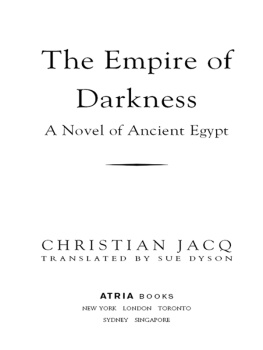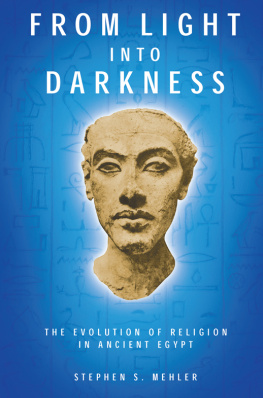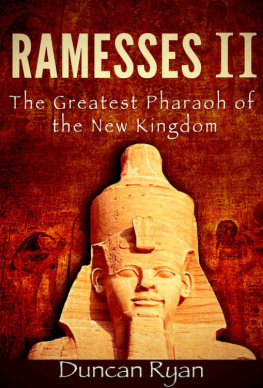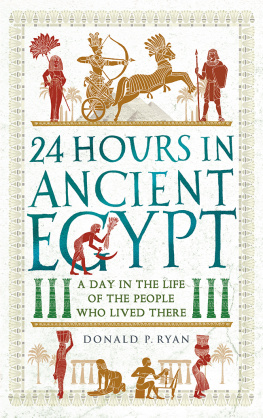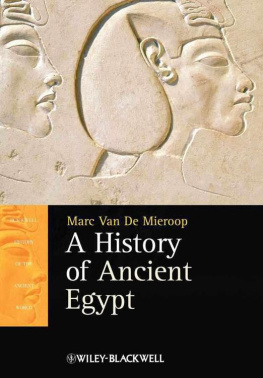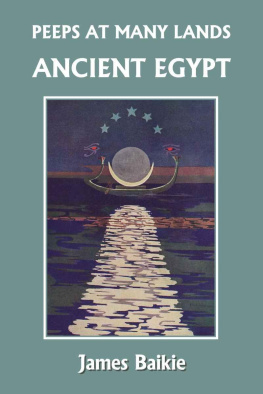The Empire of
Darkness
A BOUT THE A UTHOR
Christian Jacq is one of Frances leading Egyptologists. He is the author of the internationally bestselling Ramses series, which has been translated into twenty-four languages and has sold more than six million copies worldwide. He is also the author of the stand-alone novel The Black Pharaoh.
C HAPTER 1
A hhotep had not moved for more than half an hour. When she saw the last guard walk past the main gate of the palace, the beautiful brown-haired girl took advantage of the few minutes before the guard was relieved and scurried into a thicket of tamarisks, where she hid until nightfall.
Ahhotep was the eighteen-year-old daughter of Queen Teti the Small, and she bore a strange name, which could be translated as The Moon is Full, The Moon Has Been Appeased, or even War and Peace, for, according to the sages, the moon was a warrior god embodying the mystery of death and resurrection.
War it was the only way to rid the land of the Hyksos who controlled it allwith the exception of Thebes, the sacred city of the god Amon. Thanks to his protection, the Temple of Karnak and the town nearby had been spared by the barbarians, but for how much longer?
The Hyksos had flooded in through the Delta forty years before, like a mighty swarm of locusts. Asians, Arabs, Canaanites, Syrians, Scythians, Minoans, Cyprians, Persians, Anatolians, and yet more races, all armed to the teeth. They used strange four-legged creatures called horses, which had large heads and were bigger and faster than donkeys. The horses drew wheeled vehicles which moved incredibly swiftly and had enabled the attackers to massacre Pharaohs soldiers.
Ahhotep cursed the softness and cowardice of the feeble Theban army. True, it could not hope to measure up to the large, powerful forces of occupation, with their terrifying new weapons, but failure to act would result in annihilation. When Apophis, supreme commander of the Hyksos, eventually decided to raze Thebes to the ground, the Egyptian soldiers would run away, and the population would be massacredwith the exception of pretty women, who would be used by the brutish soldiers for their pleasure, and sturdy children, who would be sent into slavery. The last free men on Egyptian soil would bow their heads, incapable of doing anything.
What was left of the wondrous realm of the pyramid builders? A province caught between the occupying power in the north and its Nubian allies in the south, a temple built by Senusret I and left abandoned, and a palace that now looked anything but royal.
Without Teti the Smalls resolution, even the House of the Queen would have been destroyed, and the Thebans, like all other Egyptians, would have become servants of the Hyksos. But, trapped in her isolation, Teti was beginning to weaken, and the supporters of Theban independence saw their numbers fall every day.
If there were only one rebel left, that person would be Ahhotep. The young girl had no fear of battle, suffering, or death. Even with a dagger at her throat, she still would refuse to submit to the Hyksos yoke.
The courtiers mocked her as mad, regarding her as amusing rather than dangerous. They were wrong. Today was the start of the war for freedom. With an eighteen-year-old rebel as its only soldier and a well-sharpened flint knife as its only weapon.
The guard had been changed, and Thebes was asleep. It was a long time since any banquets had been held or music played in the reception hall, with its faded paintings. And there was no longer a pharaoh to take his seat upon a desperately empty throne.
Ahhotep wanted to forget this heartrending sight, and she ran toward the landing stage. At the quay lay a half-derelict cargo barge, once used to transport blocks of stone from the quarries, which the Hyksos had closed down, and a few small sailing boats.
Among them was one small boat in good condition. This was the means of transport Ahhotep planned to use to leave the Theban enclave. She jumped nimbly down into the boat and seized the oars. She was heading north, and the current would be in her favor.
No one traveled on the river at night, for there were many dangershippopotamus, crocodiles, whirlpoolsbut Ahhotep had no choice. And when we have no choice, she often declared loudly, we are free.
Determinedly, the princess began to row.
Since no one could tell her precisely where the free area ended and Hyksos-occupied territory began, she would find out for herself. The queens frightened advisers assumed that the Hyksos had made great progress since Apophiss seizure of power, and Apophiss reputation for cruelty exceeded his predecessors.
They were urging Teti to leave Thebes without delay.
But where could she live in safety?
As far as Ahhotep was concerned, the only refuge was in attack. The first skirmish would take place on the demarcation line, and, if necessary, the princess herself would command the tattered remnants of the Egyptian army.
In the past forty years, thousands of her compatriots had been massacred. The Hyksos believed they could act with complete impunity and continue their reign of terror over the Two Lands of Upper and Lower Egypt. Ahhotep soon would show them that they were very wrong.
Never had an Egyptian princess, accustomed to the luxury of court, been forced to wield heavy oars like this, at the risk of spoiling her hands. But the survival of the country was at stake, and the pretty brunette thought only of the goal she must attain.
The boat bumped hard against something and almost capsized, but by great good luck it righted itself. Ahhotep glimpsed a dark form moving away, its powerful tail thrashing in the water. She had disturbed a crocodile.
Refusing to be afraid, Ahhotep rowed on. Thanks to her excellent eyesight and the light of the full moon, she avoided the wreckage of a boat and a grassy islet where pelicans were sleeping. On the banks, the peasants houses stood abandoned. Fearing that the invaders were coming, the people had taken refuge in Thebes.
Not far away, she saw smoke.
Ahhotep slowed her pace, steered the boat toward the bank, and hid it in a papyrus thicket, disturbing a cloud of sleeping egrets. Fearing that their cries might give her away, she waited some time before moving. When she eventually climbed up the sloping bank, she found herself in an abandoned field.
Was the smoke coming from a burning farm or from a Hyksos camp? Whichever the case, the enemy was very close.
Well, well, little girl, barked an aggressive voice. What are you doing here?
Without a moments hesitation, Ahhotep swung around and, brandishing her flint knife in her right hand, hurled herself at the enemy.
C HAPTER 2
K ill it, ordered Apophis.
The young donkey saw its death approaching. Its large, soft eyes were filled with incomprehension. Why kill me? it thought. Since the age of six months, it had carried loads so heavy that they had hollowed its back. It had guided its companions in misfortune along every track and had never once lost its way. It had obeyed orders always, without hesitation. But its owner, a merchant from the Arabian peninsula who had been in Hyksos service, had just died of a blood clot, and it was the invaders custom to sacrifice a caravan leaders best donkeys and throw their remains into a makeshift grave.
Indifferent to the slaughter, Apophis climbed slowly up the steps leading to his fortified palace. It stood at the heart of the citadel that dominated his capital, Avaris, which had been built in a fertile area of the northeastern Delta.
Apophis, supreme commander of the Hyksos, was a tall fiftyyear old with a prominent nose, flaccid cheeks, a potbelly, and thick legs. His manner was icy and his voice harsh, and the mere sight of him was enough to inspire fear. People forgot his ugliness and spoke of his unfathomable gaze, which could catch a man unaware and enter his soul like the blade of a dagger. It was impossible to know what he was thinking, this man who had terrorized Egypt for twenty years.

